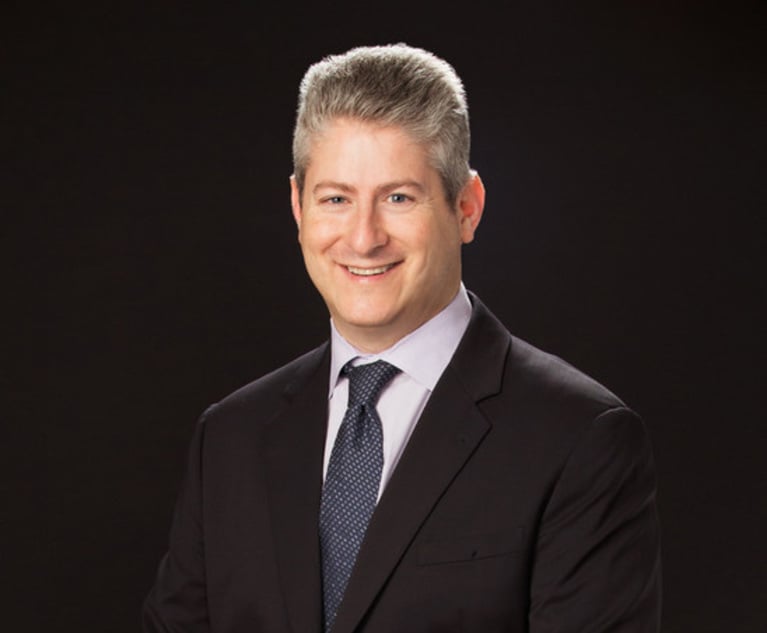NY Court of Appeals Refuses to Review Dismissal of Ex-Allen & Overy Lawyer's Sex Harassment Suit Against Firm
The decision affirms a 2016 ruling from Manhattan Supreme Court Justice Kathryn Freed that dismissed the lawsuit from Deidre Holmes Clark, a former senior attorney with Allen & Overy.
September 06, 2018 at 01:32 PM
5 minute read
 Allen & Overy's Washington, D.C., office. Photo Credit: Diego M. Radzinschi/ALM
Allen & Overy's Washington, D.C., office. Photo Credit: Diego M. Radzinschi/ALM
The Court of Appeals has declined to hear arguments from a former Allen & Overy attorney over the dismissal of her lawsuit against the firm that alleged she was fired for sleeping with a former partner.
The decision lets stand a 2016 ruling from Manhattan Supreme Court Justice Kathryn Freed that dismissed the lawsuit—which sought $35 million—filed by Deidre Holmes Clark, a former senior attorney with the firm.
Clark alleged in a 2011 lawsuit in Manhattan Supreme Court that she was fired from Allen & Overy after she had sex with Tony Humphrey, formerly a partner based in the firm's Moscow office. She also claimed in the lawsuit that Allen & Overy had used a series of sexualized writings she self-published on the internet as a pretext for her termination.
Clark represented herself in the lawsuit and also on appeal. She could not be reached for comment on the Court of Appeals decision Thursday.
The Court of Appeals generally does not explain why it declines to hear an appeal. The same was true for Thursday's decision, in which the court said it would not hear arguments in the case.
Rachel Fischer, an associate at Proskauer Rose, represented Allen & Overy in the lawsuit. She declined to comment on the decision when reached by phone on Thursday.
A spokesman for Allen & Overy did not immediately return a request for comment Thursday.
Clark's own actions may have been her lawsuit's undoing in this case, according to the Appellate Division, First Department, 2018 decision that the Court of Appeals declined to review.
Clark's lawsuit against Allen & Overy included allegations of sexual harassment, retaliatory discharge and intentional infliction of emotional distress. According to a 2015 First Department's decision dealing with medical issues in the case, Clark claimed the firm's actions caused her severe anxiety and mental health problems, including suicidal thoughts.
The First Department said in 2015 that Clark testified at her deposition that “her emotional distress has included experiencing eczema all over her body, hair pulling, anxiety, depression and suicidal feelings.”
Attorneys for Allen & Overy moved at the time to require Clark to undergo an independent medical examination to rebut her claims of emotional distress. The court granted that motion and ordered Clark to sit for the exam. Clark appealed the court order, but the motion was upheld by the First Department.
Despite the order, Clark initially refused to sit for the exam. She was warned in September 2015 that if she did not undergo the exam, she could face sanctions, including the dismissal of her complaint against Allen & Overy.
She showed up to the examiner's office two months later, but, again, refused the conditions of the exam, according to the decision from the First Department in March 2018.
“She refused to take the microphone to be audiotaped, and she informed the examiner that she would go to the police and charge him with false imprisonment and assault if he proceeded with the examination without her consent,” the court's decision said. “The examiner stopped the examination.”
Attorneys for Allen & Overy were then granted a motion to dismiss the lawsuit in August 2016.
Clark was also ordered to pay $5,000 to the Lawyers' Fund for Client Protection after she posted about the case on social media, despite sealing orders from the court. The First Department said her social media posts were intended to “harass or maliciously injure” Allen & Overy, despite the ongoing litigation.
Clark is separately suing Allen & Overy over claims that the firm illegally hacked into her email account and stole messages sent to her friends and a former lover about her personal life, including sexual relationships. Clark said in her complaint that the firm used those emails to support their case for her to undergo the psychological exam as part of the previous lawsuit.
Allen & Overy, still represented by Proskauer, has moved to dismiss the lawsuit, but a decision on that motion has not been filed. In a brief filed late last year, attorneys for Allen & Overy denied Clark's claims and said the statute of limitations had already passed.
That case is also being handled by Freed.
Clark sent a letter to Freed in June asking her to recuse herself from the case. Clark said, according to the letter, that Freed had reported her to one of the state's Grievance Committees, which are able to discipline attorneys for misconduct. Clark said in her letter that she wants a different justice because of the complaint, which was sent earlier in June.
“Frankly, I am surprised that you did not immediately recuse yourself under these outrageous circumstances,” Clark wrote.
The proceedings of the state's Grievance Committees are not public, but as an attorney Clark is obliged to comply with committee investigations.
READ MORE:
Dismissal, Sanctions Upheld in Ex-Allen & Overy Lawyer's Sexual Harassment Suit Against Firm
Arguments on Rochester Judge's Removal at NY Court of Appeals Focus on Alcoholism, Public Confidence
This content has been archived. It is available through our partners, LexisNexis® and Bloomberg Law.
To view this content, please continue to their sites.
Not a Lexis Subscriber?
Subscribe Now
Not a Bloomberg Law Subscriber?
Subscribe Now
NOT FOR REPRINT
© 2025 ALM Global, LLC, All Rights Reserved. Request academic re-use from www.copyright.com. All other uses, submit a request to [email protected]. For more information visit Asset & Logo Licensing.
You Might Like
View All

Cooley Promotes NY Office Leader to Global Litigation Department Chair

NY Judge Resigns After Avoiding Jury Duty by Telling Court He Couldn't Be Impartial

Charlie Javice Jury Will Not See Her Texts About Elizabeth Holmes
Trending Stories
- 1GOP-Led SEC Tightens Control Over Enforcement Investigations, Lawyers Say
- 2Transgender Care Fight Targets More Adults as Georgia, Other States Weigh Laws
- 3Roundup Special Master's Report Recommends Lead Counsel Get $0 in Common Benefit Fees
- 4Georgia Justices Urged to Revive Malpractice Suit Against Retired Barnes & Thornburg Atty
- 5How Gibson Dunn Lawyers Helped Assemble the LA FireAid Benefit Concert in 'Extreme' Time Crunch
Who Got The Work
J. Brugh Lower of Gibbons has entered an appearance for industrial equipment supplier Devco Corporation in a pending trademark infringement lawsuit. The suit, accusing the defendant of selling knock-off Graco products, was filed Dec. 18 in New Jersey District Court by Rivkin Radler on behalf of Graco Inc. and Graco Minnesota. The case, assigned to U.S. District Judge Zahid N. Quraishi, is 3:24-cv-11294, Graco Inc. et al v. Devco Corporation.
Who Got The Work
Rebecca Maller-Stein and Kent A. Yalowitz of Arnold & Porter Kaye Scholer have entered their appearances for Hanaco Venture Capital and its executives, Lior Prosor and David Frankel, in a pending securities lawsuit. The action, filed on Dec. 24 in New York Southern District Court by Zell, Aron & Co. on behalf of Goldeneye Advisors, accuses the defendants of negligently and fraudulently managing the plaintiff's $1 million investment. The case, assigned to U.S. District Judge Vernon S. Broderick, is 1:24-cv-09918, Goldeneye Advisors, LLC v. Hanaco Venture Capital, Ltd. et al.
Who Got The Work
Attorneys from A&O Shearman has stepped in as defense counsel for Toronto-Dominion Bank and other defendants in a pending securities class action. The suit, filed Dec. 11 in New York Southern District Court by Bleichmar Fonti & Auld, accuses the defendants of concealing the bank's 'pervasive' deficiencies in regards to its compliance with the Bank Secrecy Act and the quality of its anti-money laundering controls. The case, assigned to U.S. District Judge Arun Subramanian, is 1:24-cv-09445, Gonzalez v. The Toronto-Dominion Bank et al.
Who Got The Work
Crown Castle International, a Pennsylvania company providing shared communications infrastructure, has turned to Luke D. Wolf of Gordon Rees Scully Mansukhani to fend off a pending breach-of-contract lawsuit. The court action, filed Nov. 25 in Michigan Eastern District Court by Hooper Hathaway PC on behalf of The Town Residences LLC, accuses Crown Castle of failing to transfer approximately $30,000 in utility payments from T-Mobile in breach of a roof-top lease and assignment agreement. The case, assigned to U.S. District Judge Susan K. Declercq, is 2:24-cv-13131, The Town Residences LLC v. T-Mobile US, Inc. et al.
Who Got The Work
Wilfred P. Coronato and Daniel M. Schwartz of McCarter & English have stepped in as defense counsel to Electrolux Home Products Inc. in a pending product liability lawsuit. The court action, filed Nov. 26 in New York Eastern District Court by Poulos Lopiccolo PC and Nagel Rice LLP on behalf of David Stern, alleges that the defendant's refrigerators’ drawers and shelving repeatedly break and fall apart within months after purchase. The case, assigned to U.S. District Judge Joan M. Azrack, is 2:24-cv-08204, Stern v. Electrolux Home Products, Inc.
Featured Firms
Law Offices of Gary Martin Hays & Associates, P.C.
(470) 294-1674
Law Offices of Mark E. Salomone
(857) 444-6468
Smith & Hassler
(713) 739-1250






